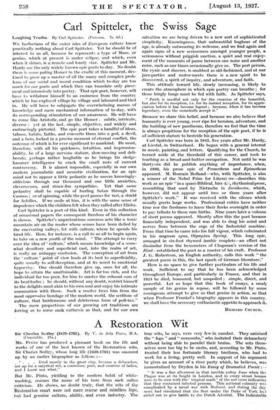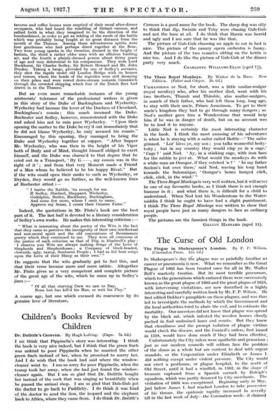A Restoration Wit Sir Charles Sedley (1639-1701). By V. de
Sole Pinto, M.A. (Constable. 21s.) Mn. PINTO has produced a pleasant book on the life and Works of one of the best known of the Restoration wits,
Sir Charles Sedley, whose long life (1639-1701) was summed pp by an earlier biographer as follows :—•
" . lived mostly in the great city, became a debauchee,
set up for a satyrical wit, a comedian, poet, and courtier of ladies, and I know nut what."
But Mr. Pinto, yielding to the modern habit of white- washing, reseues the name of his hero from such sullen criticism. He shows, no doubt truly, that the wits of the kestoration court. were. not mere `coarse and mindless fops, bid had genuine culture, ability, and even industry. The true wits, he says, were very few in number. They satirized the " fops " and " coxcombs," who imitated their debauchery without being able to parallel their brains. The wits them- selves were too big to be snobs, and, according to Mr. Pinto, treated their less fortunate literary brethren, who had to work for a living, pretty well. In support of his argument he gives an account of a river party which, he believes, was immortalized by Dryden in his Essay of Dramatick Poesie :--- " It was a fine afternoon in that terrible sultry June when the Plague was at its height in London, and in every street houses were to be seen with the tragical mark' of the red cross indicating that they contained infected persons. This national calamity was complicated by a naval war with Holland. and during the day news had circulated that the fleet under the Duke of York had sailed out to give battle to iho Dutch Adthirel. The fashionable taverns and coffee houses were emptied of their usual after-dinner occupants, who had heard the rumbling of distant cannon, and sallied forth in what they imagined to be the direction of the bombardment, in order to get an inkling of the result of the battle which was probably being fought at no great distance from the mouth of the Thames. Among these adventurous spirits were four gentlemen who had perhaps dined together at the Rose. Two were young sparks in the twenties, dressed in the height of fashidn, the third a rather older man with an officious bustling air, and the fourth a plainly-dressed person about thirty years of age and very deferential to his companions. They were Lord Buckhurst, Sir Charles Sedley, Sir Robert Howard and Mr. John Dryden. Taking a barge, provided by one of Sedley's servants, they shot the rapids under old London Bridge with its houses and towers, where the heads of the regicides were still decaying on their, pikes and were rowed down-stream towards Greenwich through the crowded shipping which fear of the Dutch fleet had drawn in to the Thames."
But an even more remarkable instance of the young aristocrats' tolerance of the professional writers is given in this story of the Duke of Buckingham and Wycherley. Wycherley had become the lover of the Duchess of Cleveland, Buckingham's cousin ; this much incensed the Duke. Rochester and Sedley, however, remonstrated with the Duke and asked him not to ruin poor Wycherley. " Upon their opening the matter to the Duke he cry'd out immediately that he did not blame Wycherley, he only accused his cousin." Encouraged by this opening, they managed to bring the Duke and Wycherley together at supper. " After Supper Mr. Wycherley, who was then in the height of his Vigor both of Body and of Mind, thought himself obliged to exert himself, and the Duke was charm'd to that degree that he cried out in a Transport, ' By G—, my cousin was in the right of • it ' ; and from that very Moment made a Friend of a Man whom he believed to be his happy Rival." But if the wits could open their ranks to such as Wycherley, or Dryden, they would go no further, as the well-known lines of Rochester. attest :— " I loathe the Rabble, 'tis enough for me If Sedley, Shadwel, Sheppard, Wicherley, Godolphin, Butler, Buckhumt, Buckingham, And some few more, whom I omit to name, Approve my Sense, I count their Censure Fame."
Indeed, the quotations in Mr. Pinto's book are the best part of it. The last half is devoted to a literary consideration of Sedley's own works. He makes this interesting criticism :-
" What is interesting about the poetry of the Wits is the fact that they came to perceive the incongruity of their own intellectual and non-moral spirit and the old conventions of Renaissance poetry which they continued to use. They were all conscious of the justice of such criticism as that of Prig in Shadwell's play : I observe you Wits are always making Songs of the Love of Shepherds and Shepherdesses ; a Company of block-headed, clownish, ugly, tawny, Sunburnt People ; I had as lief hear songs upon the Love of their Sheep as their own.' "
He suggests that the wits gradually got to feel this, and that their verse became more and more satiric. Altogether Mr. Pinto gives us a very competent and complete picture of the great age of the wits, which he sums up in Sedley's lines :-
" Of all that starving Crew we saw to Day, None but has kill'd his Man, or writ his Play."
A coarse age, but one which excused its coarseness by its genuine love of literature.































 Previous page
Previous page